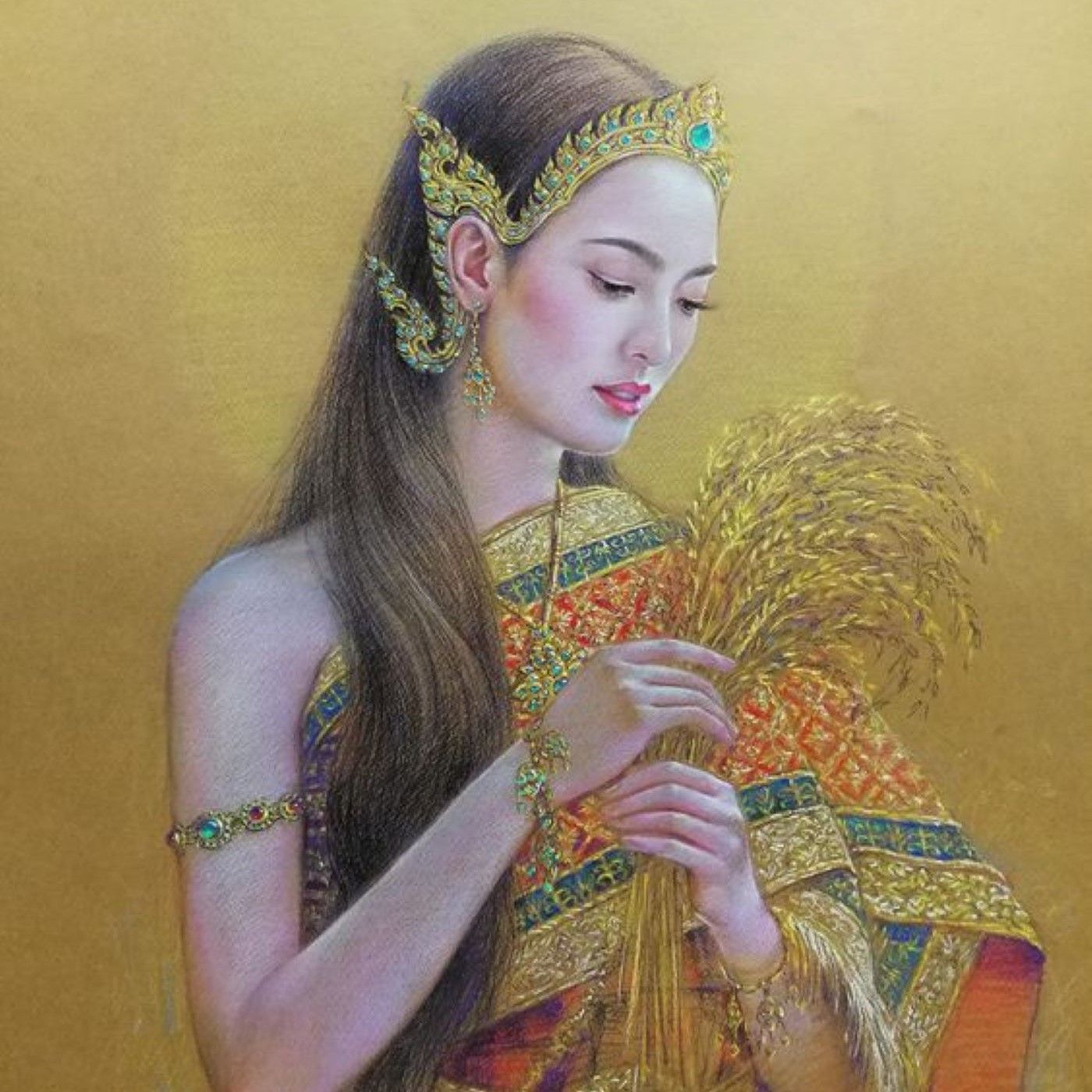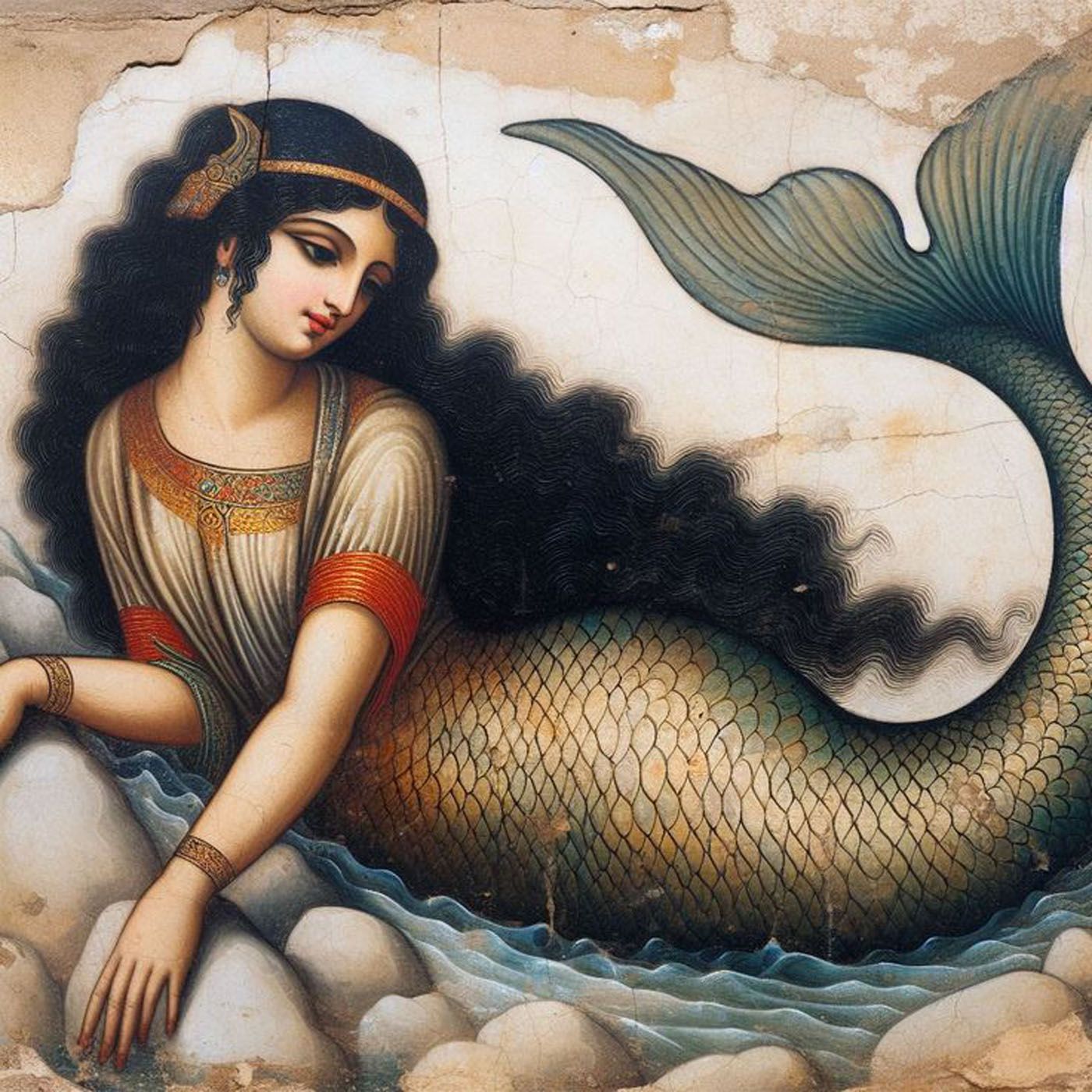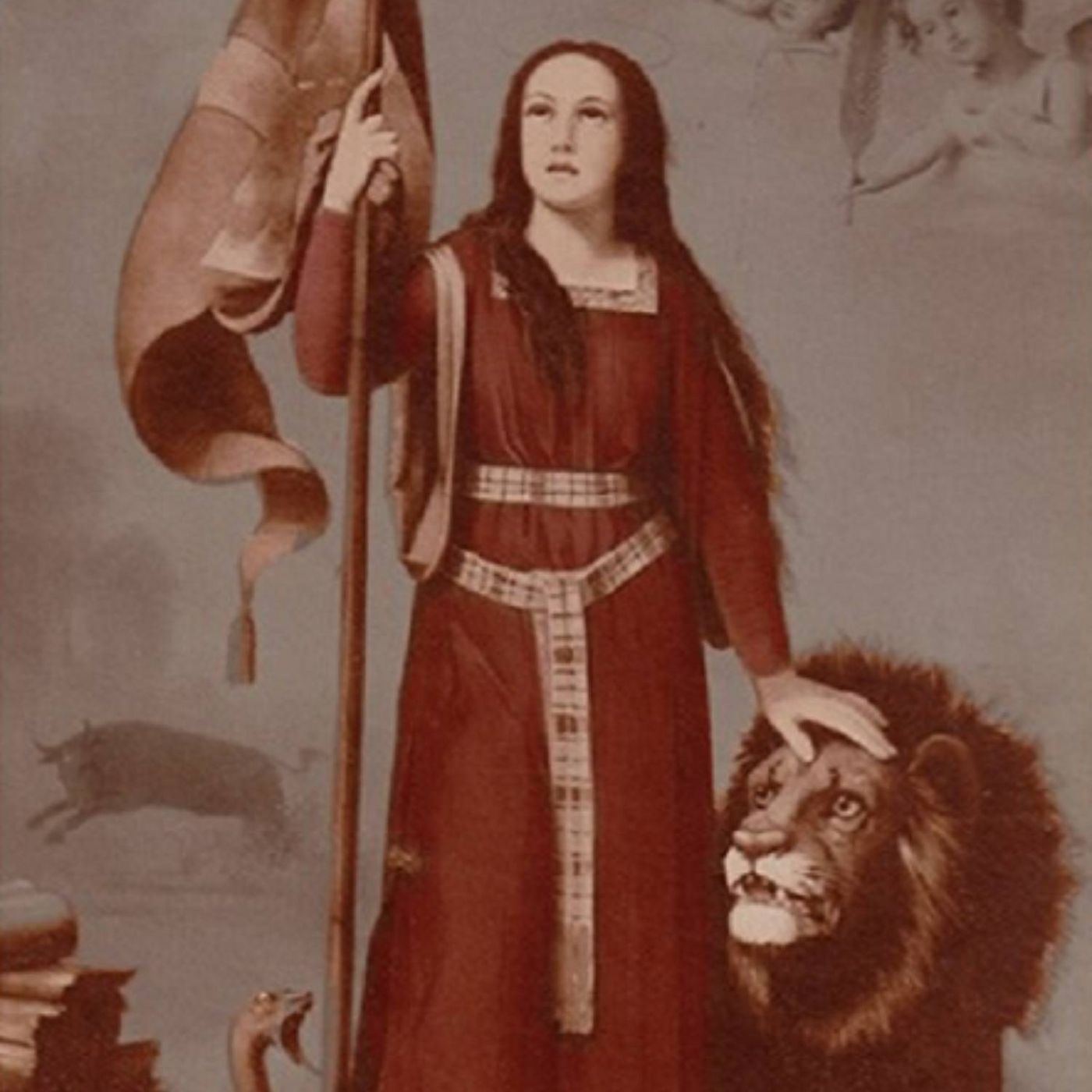Listen to Part Two at https://www.spreaker.com/user/8255993/thecla-part-two
Show Notes
This is the longest of stories I have written yet, but I just couldn’t leave any part of her story out.
So I’ve divided it into two episodes. This episode is Part One.
Thecla is the first of our stories to come from Christianity and another that retells the story of one who lived and was recorded in history. Her story is part of the apocryphal books of the bible- the ones that were removed from official editions. In the fourth century Emperor Constantine held the Nicaean Council with all the Christian bishops to establish unity and consistency across Christianity. Part of this also involved deciding which books of the bible would stay and which ones would go. The Gnostic texts such as the Gospels of Mary Magdalene and Thomas were taken out.
So too was the story of Thecla despite its affiliation with Paul, whose model of Orthodox Christianity was the one agreed to at Nicaea. However, Thecla’s story also shows that women could and can be self-empowered. Following the standard path of marriage and motherhood was not their only choice. Nothing declares this self-empowerment more than when Thecla baptises herself.
Show Transcript
Her story begins in the ancient lands of Anatolia, now known as Turkey.
Thecla was a “good girl”. Born into a respectable family, she followed the ways set out before her. She learnt all the things required of her to grow into an honourable woman, so it was no surprise when an equally honourable man, raised the same respectable way, asked for her to be his wife. All was as it should be and Thecla’s mother, now a widow and sole parent, could hold her head up as she walked the town with pride at the security of her daughter’s future through this betrothal.
Then one day a foreigner arrived in their town and that future would be rewritten.
Talk had bubbled for some years now about a self-proclaimed prophet who had been teaching to the south of Anatolia in the lands known as Canaan. He had been speaking of such things as compassion and love which were not so confronting. However he also claimed that he was the son of God, and that every person was also God’s child infused with the creator’s power and glory.
The prophet had gathered followers and travelled the land sharing his message. In doing so, he provoked thoughts and actions amongst the commoners that put fear into the ruling powers. Those governing soon put an end to his teaching, executing him by crucifixion.
One would think that would have put an end to his story. Instead, the story grew bigger.
Now there were reports that he had miraculously survived, emerging from his tomb and being reunited with his closest of devotees. Soon after the prophet ascended to the heavens, affirming his sacred authority, and empowering his followers to spread his teachings as far as possible.
So it was that Paul, one of these devotees, made his way north into Anatolia and to Thecla’s town of Iconium.
Onesiphorus, a nobleman of Iconium, had heard of Paul’s imminent arrival many days before. He set up vigil at the town’s outskirts, on the road that made way from the south, to ensure that he would be the first to greet the man. He knew that Paul was short, bald headed and bandy legged. However it was none of these features that drew Onesiphorus to know without hesitation that Paul had finally arrived. The nobleman would say to everyone that it was Paul’s presence that made him so sure.
“He walked as I imagine an angel would,” Onesiphorus would say.
The nobleman poured upon Paul his praises to such an extent that Paul’s companions raised their eyebrows and sighed, in equal parts dubious of the man’s intentions as well as jealous of his exuberance.
“Please, let me host you at my home,“ Onesiphorus implored. “All of you!”
This final part dissolved the resistance in Paul’s companions, as the assurance of a comfortable bed and a fresh meal always does for those who have travelled far.
Once settled within the nobleman’s home, Paul began his ministry, sharing the wisdom of his teacher, Jesus Christ. His audience began with some close friends of Onesiphorus but soon grew as more townsfolk heard about Paul and wanted to hear just what he was speaking of. As such Onesiphorus’ house became a church.
Thecla had heard the rumblings surrounding the foreigner’s arrival and though fascinated she dare not entertain the idea of making her way to Onesiphorus’ home even though it was close by her own. It turned out though that she didn’t need to.
One day as Thecla passed by a window within her own home, one that faced towards the house of Onesiphorus, she could hear Paul’s voice. At first it made her stop as she was fascinated by the sound of a foreign tongue, but what made her stay to listen were his words.
Thecla pulled a chair to sit by the window, and there she remained for three days.
She listened to his words intently and as she did she felt something within her blossom and ripen. His words gave birth to new thoughts and as her mind danced with these fresh ideas, Thecla saw that there were more possibilities for the life unfolding before her.
No longer did she see the one single path that all women around her took; marriage and motherhood were no longer the only and inevitable option.
As Paul spoke of each person having their unique connection to God so too he spoke of how a pure and chaste body keeps this connection strong. Thecla sat drinking in the words. This God that Paul spoke of would offer his love to her and it would strengthen what was growing within her.
For Thecla had always felt like something was missing. Her life, as ordered and privileged as it was, seemed dull and empty. Now in the space of three days, with the words of a foreigner floating through her window she understood what had been lacking for her.
It was as though all her senses were now reborn and reconnected to the very foundations of life. Finally she had passion for her very existence.
Thecla’s mother stood and watched her daughter by the window day after day. Thecla had not spoken or even asked of her betrothed and this concerned her mother greatly. She knew Thecla was listening to the stranger and she approached her daughter to entice her from the window. Thecla’s refusal to leave her position was insistent and this enraged her mother.
The mother sent a message for Thecla’s betrothed to come immediately and this he did. Thamyris arrived intrigued, however when the mother shared her concerns, he joined her in anger.
“You must convince her to forget this man and his ways,” the mother demanded. “These new ideas and practices are dangerous. He speaks of one God above all others. Worse still she is convinced that she will remain pure to receive this god’s love. He has seduced her mind and now her body will follow. If this spell is not broken, then your marriage will not happen.”
Though Thamyris held great respect for the mother he doubted this could be possible. However when he approached Thecla now at the window and called her name, she barely turned her head to acknowledge him. Thamyris now knew that the mother spoke truth.
Thamyris made his way to Onesiphorus’ home to see for himself who this foreigner was and what exactly he was speaking of. Just near the entrance to the house he saw two men talking heatedly. Their voices were loud and their hands moved intensely to amplify their emotions. Thamyris thought they were just arguing amongst themselves but as he came close he could hear they were sharing their woes and that their discontent was caused by Paul.
They too spoke of young women, as well as men, refusing marriage after attending Paul’s many talks. Thamyris invited the men to his home for dinner and as they ate and drank much wine they told Thamyris more of what the apostle was teaching.
“He speaks of eternal life through this worship of this great God, and that the purity of their body shall attain this,” one said.
The other scoffed and added “How do we convince these young one’s that marriage and creating children is this resurrection they desire…. And that we need. Soon no virgin shall find a husband and equally no man shall have a wife!”
Thamyris with his blood now hot with rage decided what must be done.
The next morning, he arrived at the magistrate’s office and made his case with absolute confidence. Aside from the disruption to his own life, he pleaded on behalf of the town and its people.
“These Christians and their ways must be stopped!” he begged of the magistrate. Not much else was needed to be said as the followers of Christ were already being persecuted throughout the kingdom. The magistrate was determined that this new teaching would not take hold in his jurisdiction.
It was not much later that Thamyris, accompanied by the magistrate, a jailor and a large group of men in his support, arrived at Onesiphorus’ house demanding that Paul come and face them.
This Paul did with steady hands and calm countenance. It was not his first-time encountering anger stoked by fear, and Paul knew it would not be the last. He also knew his faith would protect him.
The magistrate demanded that Paul disclose what exactly he had been sharing and what his intentions with the villagers were. As always Paul spoke openly and loudly.
“I thank you Governor for granting me an audience with you. I am here on God’s behalf to offer salvation to his creations. With his love I offer them a life free from sin and any temptation to sin again. I do this through the teachings of his son Jesus Christ who was sent by God. There is no crime in what I do,” he declared.
As passionate and honest Paul’s declaration was, his confession to teaching the Christian faith was all the magistrate needed to bind him and place him within a prison cell to await further interrogation.
Word of his imprisonment carried through the town quickly. Thecla, already desperately missing Paul’s voice, was crest fallen when her mother proudly announced what Thamyris’ protest had led to. Thecla took a deep breath and held her words within her. She looked at her mother and simply nodded, offering the woman the minimal respect needed to ensure that she believed her daughter would now comply with her expectations.
Thecla was far from returning to her former path. As night fell she slipped from the house. Keeping in the shadows to avoid being seen and stepping lightly so she would not be heard as she made way to the prison.
The guard by the door laughed heartily when she asked to enter.
“Run home, little girl! This is no place for you, especially not at this hour,” he bellowed.
Thecla stood firm in place and slid from her wrist a gold bracelet. As she held the bracelet out to the guard his laughter stopped and his smile fell from his face. He took the gold and pushed it into his pocket then turned to open the door for Thecla.
Inside Thecla walked down a long corridor lit by a single lamp at its end. As she walked closer she saw that was where the jailor sat, writing in his ledger. He did not see or hear Thecla until she was almost upon him and he whelped in surprise when her shadow alerted him.
“What….how??....Guard!! Guard!!” he cried out.
“He has my bracelet. You can have these,” Thecla said calmly and handed the jailor her gold earrings. “Now let me see Paul the apostle.”
The jailor walked her to a door with a small window cut high within it. He peered in and called out, “Christian! You have company!” He unlocked the door and gestured for Thecla to enter.
Paul, who had been sleeping upon the floor, sat up and watched as the young woman walked through the doorway. At first she stepped hesitantly into the dark space, unsure of just who she was being let in to see.
“My child, bless you for your company but surely you should be with your family at this hour,” he said softly.
Thecla hearing the familiar voice rushed forward and fell to her knees before him.
“My lord, you are more than my family could ever be,” she said before bursting into tears.
Paul put out his hand and Thecla placed hers upon it and her tears subsided.
“Shall we pray together?” he asked and Thecla nodded.
So they prayed and finally Thecla could ask all the questions that were within her.
“What is all this I am feeling inside?” she asked
“It is your connection to God. It is your truth,” Paul answered.
Thecla choked back tears when she said, “Are you not afraid that they will kill you for believing such things?”
Paul smiled, “I do not fear the death of my body for I know I will live eternally with Christ.”
Thecla paused for a moment and now she looked closely at Paul. She saw his breath was calm and solid, his eyes were wide open and not one line of worry was upon his face. He even smiled as he spoke of dying.
Thecla sat back and took in a sharp breath.
“There is no need for fear,” she said, and it was not a question so much as a revelation. “Christ will protect me and carry me to the heavens when my time is done.”
Paul kept smiling and nodded.
At first Thecla’s maid was not so alarmed when she did not find her mistress within her bed the next morning. She simply assumed that she was once again sitting by the window listening to Paul’s ministry. Then she recalled what every person in Iconium knew: that Paul was imprisoned. She shrieked and ran from the room to find Thecla’s mother.
The mother knew immediately where her daughter was and made her way to the jail. Just as she arrived Paul was being led to the court for his hearing and it was no surprise that her daughter walked sulkily behind him.
In equal parts enraged and embarrassed by Thecla’s actions the mother cried out to the magistrate, “You may as well take her to trial as well. She refuses to a marriage already agreed to and with dowry paid!”
Thecla remained calm and quiet, even as a jailor grabbed her upper arm and began to lead her where she was already walking. Paul had shown her that no fear was needed and even with her own mother calling for her persecution, all she felt to do was say a silent prayer to Christ to be with her and guide her through whatever would happen next.
Within the courthouse Paul with his hands bound stood before the magistrate, who could barely hide his contempt. How dare a foreigner, the acolyte of a condemned man, come to his town and convert his people? The magistrate also had no desire or authority to persecute a foreigner and the complications that would lead to.
“Leave this town in this hour and never return! If you do then I shall bestow the harshest of punishments upon you and anyone who harbours you.”
Paul’s hand bindings were loosened, and he was escorted through the door. Thecla watched with relief, even though she wondered if she would ever see him again. For now though it was her turn to be addressed by the magistrate.
Her mother also within the courtroom had spat laughter as Paul stepped outside and began his exile. Surely now with that foreign troublemaker gone Thecla would awaken from her stupor and once more be the good, respectable daughter she once was. She beamed with joy as Thecla went to face the magistrate.
“Thecla, beloved daughter and citizen of Iconium, you are brought here to face the charge of not honouring your marriage agreement to Thamyris. Is this true?” he asked.
Thecla looked up at the magistrate, her eyes open and clear. Though her hands were not bound, they held each other and rested before her. With her gaze fixed ahead she remained silent.
Thecla’s mother groaned and she began to make way to her daughter but the magistrate held up his hand making her stop in place.
“Thecla,” he now implored, “Just say you will honour your betrothal and this is complete. You can return home and life will be as it should.”
Thecla closed her eyes and took a deep breath. When she opened them she visibly squared her shoulders and once more set her gaze to the magistrate while not uttering a word.
The mother was now livid. It was clear that her daughter was beyond redemption and she began to shout.
“You see, Sire, you see! She is lost to us completely. The foreigner’s words have broken her. Burn her! Burn her so that no other will be tempted to follow such foolishness.”
With those words she handed the magistrate the most perfect solution. Thecla would be sizeably punished and an example would be set to any other who refused their arranged marriages. Paul was gone and now they could eradicate any rogue thoughts still lingering from his visit.
Thecla would be burnt at the stake in the town centre that very day.
It was ordered that the young men and women of the town would gather bundles of wood for the pyre. This they did obediently, through fear of their own punishment all while directly seeing what following the teachings of the apostle would lead them to.
Thecla was made to watch in the hope that the reality of her sentence being arranged before her might incite a reversal of her decision. Of course, it did not, as she remembered Paul within his cell and his fearlessness for whatever lay ahead. If she should die today, then she would just join Christ sooner than expected.
When the wood pile was complete, the magistrate’s men dragged Thecla towards it. A rowdy crowd had gathered and Thecla looked amongst them earnestly, hoping that Paul may have returned to save her or, in the very least, be present to offer her some solace. As the men pulled at her clothing, stripping her bare, she kept searching amongst the faces and then she saw him.
Paul’s face appeared and while those around him jeered and heckled, he stood still and silent. Then his face transformed into another’s. Though Thecla had never met Jesus, she knew she was now looking at his image. As quickly as she acknowledged this, he transformed once again, this time into a shimmering light that rose up and dissolved above the crowd.
Thecla smiled.
“Girl, please! Just say you will marry the man and we don’t have to do this!” one of the guards all but begged her.
Thecla would not. For her vision had made her faith even stronger. Instead she made the sign of the cross and stepped upon the pyre, rested her back upon the stake standing in its centre and readied herself to be bound.
The shouts of the crowd grew louder as one guard tied her to the pole and then they grew even louder again as another guard stepped forward with the torch to light the wood. He paused for a moment, also hoping Thecla would have a change of heart. When he looked to her Thecla was looking up at the heavens instead and he furrowed his brow as he thought he could see her still smiling.
He had no choice now. He pushed the lit torch to the pyre and the fire began.
The flames should have risen quickly and engulfed Thecla within minutes. Instead they flickered and danced as though they had no intention of even burning the wood let alone the girl. More torches were lit and pushed into the pile at other points, but these too puckered like tapers.
The guards began to argue that the wood must be too green or had been gathered wet, and should they get more when a deep rumbling sound was heard beneath them. The crowd could hear it too and soon all that were gathered were silenced as they listened.
The sound grew and now the ground began to shake. Suddenly there was a loud tearing sound and the ground before the pyre opened as though it had been cut with a knife, pulling those close to the crevasse within it, while the rest ran for their lives.
Now the heavens joined in. A huge clap of thunder shook the sky and heralded a downpour of rain that extinguished the flames of the pyre.
Thecla remained in place; untouched and unharmed, knowing that each drop of water was confirmation that she had been saved by divine powers.
The first guard who had offered her opportunity to confess and be saved now ran to her and cut her bindings.
“Go! Gather your clothes and leave!” he yelled through the rain.
Once more clothed Thecla made way out of the town. Like Paul she was now effectively exiled. Her mother would never receive her again in their family home, not that she cared to return to a mother who had condemned her. If another townsperson dared offer her a home, the magistrate would simply come knocking to attempt the cremation again, probably adding her hosts as well.
Instead she would search to find Paul and join him in teaching the ways of Jesus, just as her heart ached to do.
Paul had fled Iconium soon after leaving the magistrate’s court. First, he had returned to Onesiphorus’ house to gather his things. Onesiphorus was at first delighted when Paul walked into the house but that joy soon dissolved when Paul told him of his sentence of exile.
“I will come with you,” Onesiphorus declared and called out to his family to make ready for departure.
“There is no time for such things,” Paul explained.
“Fine then. We shall come as we are. The Lord will provide all that we need,” the nobleman said and called out to his family once more.
So Paul along with the family of Onesiphorus walked to the town outskirts and made way into the hills surrounding Iconium. Some townspeople sneered and even spat as they passed the travellers.
One even cried out “You have sentenced a woman to death. You villain!”
“What do you speak of?” questioned Onesiphorus.
“Thecla shall be burnt for listening to this criminal’s words!” the man shouted before walking away.
Paul stopped and closed his eyes. “Lord save and protect her. Lord save and protect her…..” he murmured.
“Come we must continue,” Onesiphorus begged and Paul was pulled from his reverie and continued to walk.
They walked for much of the day and mostly in silence, apart from Paul’s continued prayers for Thecla’s protection, and when Onesiphorus and his wife were deciding what roads they would take. They were in-between towns when Paul asked that they stop travelling for the day.
“We are but less than an hour to the next village and some shelter,” Onesiphorus explained.
Paul shook his head. “We need to stop here!” he declared and began to make his way up the hillside that flanked the road.
The family scrambled after him, puffing and groaning as they slid on loose ground or picked up a sharp rock in their sandals. Thankfully this was not for too long as Paul stopped suddenly and whooped in delight.
“See, as you said my friend, the Lord will provide.”
He gestured before him to an opening in the hillside that led into a wonderful stone lined cave. The floor was even and clear of debris, almost as though someone had swept it in readiness for their arrival. The travellers made their way in, out of the hot sun and rested.
They remained several days within the cave as Paul prayed almost continuously for Thecla’s protection. He fasted as he did so with Onesiphorus joining him in the fast. However Onesiphorus’ family soon depleted the small amount of food they had managed to carry with them and they grew hungry. Very hungry.
Onesiphorus also desired to eat and he handed a small purse to his eldest son, asking him to head to the local village and buy some food and wine for them all.
The boy had just finished at the markets and was about to return to his family when he heard a familiar voice call his name. He looked around to see it was Thecla. His delight in seeing her alive and well was matched by Thecla’s own joy at seeing a familiar face and hearing Paul was nearby.
The two made their way back to the cave and the boy hurried ahead of her in the final part of the climb to announce her arrival.
Paul mistook the excitement of the boy’s return as the family’s relief to have food. He remained upon his knees in prayer, not even noticing the extra voice calling out its greetings. It wasn’t until Thecla stood right beside him and called out “Paul, it’s me!” that he looked up. When he realised it was Thecla he cried thanks to Christ and broke into tears.
Paul now broke his fast, joining the family and Thecla to share bread and wine, while listening to Thecla share all that had unfolded after his departure. This was followed by Onesiphorus’ sharing how they had travelled and then found the cave. Together they reflected and gave thanks for the wonders of the Lord’s work within their lives.
It was then that Thecla spoke directly to Paul and told him of her intention to travel with him and join him in teaching. Paul gave her a half smile but his face wore a look of hesitation.
“My sister, you are young and have great beauty. Men will be tempted by you and in turn, you shall be tempted by them. Your chastity will be greatly tested and I cannot promise it will remain pure,” he said bluntly.
“Oh but you can!” Thecla cried. “Baptise me! God has shown he favours me already. Surely with the Lord’s seal by your anointing I shall be protected?”
Paul shook his head. “I shall not. You’re not ready. With patience we will be shown when you can be baptised.”
Thecla was heartbroken. All her joy and relief to find Paul had been smashed by this rejection. She sat silent and looked down, not bearing to look into Paul’s eyes anymore.
“Oh come now, Thecla,” he continued. “We shall still travel and teach together and that is wonderful.”
It was wonderful and Thecla gathered herself, remembering the blessings she had already received.
The next morning the group left the cave. Paul insisted that Onesiphorus return with his family to Iconium while he, with Thecla by his side, made way to the city of Antioch.
Antioch was founded four hundred years before and lay upon the great River Orontes. It was dynamic and seemed to pulse like a heart. Paul and Thecla were excited for who they would teach here.
It was easy to blend in at this new city. Foreigners arrived all the time in Antioch for trade or as they made their way onwards to another place. The two walked with ease amongst the crowds and found many willing to engage with them. Soon they were being invited into homes as guests as well as to preach.
Unfortunately, it was in Antioch that Paul’s fears for Thecla were confirmed.
Alexander was a very wealthy man of Syrian descent. His wealth was matched by his political prowess and so as well as being a noble he also held rank as a magistrate; shaping and reforming laws as they were needed.
One day he saw Thecla walking with Paul and was besotted. Apart from her natural beauty, she walked with a confidence that made her even more alluring. Alexander made enquiries and when he found out that Thecla was not Paul’s wife he began his mission to make her his own.
Alexander attended as many of Paul’s talks as he could. He arrived each time with generous gifts or even a purse of coins to show his support, but mostly to gain Paul’s favour. When Alexander felt he had showered Paul sufficiently he finally made known his intentions. Asking to speak with Paul alone, Alexander asked that Thecla be given to him in marriage.
“Sir, she is not mine to give to anyone,” Paul replied plainly.
This did not deter Alexander in the slightest. In fact, he now felt empowered. With the traditional structures of a betrothal removed he could act how he wished. To his delight, it was soon after his conversation with Paul that Alexander happened upon Thecla walking alone within one of the town squares. Believing his lust was justified by his social position, and his gender, he walked up to Thecla, grabbed her arm and pulled her towards him, pushing a kiss upon her.
Thecla, though caught unaware, managed to turn her face in time so that his lips landed upon her cheek rather than her lips as it was intended. As she did she cried out in protest, hoping Paul would be nearby and come to her aid.
Alexander did not ease his grip and with his face still close to hers he proposed marriage to her, though it was not with any romantic notions or basic consideration for the woman.
Thecla now not only screamed but writhed as she tried to pull away.
“I did not refuse marriage to Thamyris to have it put upon me again by another, no matter who they are!” she screamed as people now stopped to see what was happening.
Thecla was oblivious to them all as her anger at being molested now became a rage. Her writhing became thrashing as she beat upon Alexander with her free hand. Her feet too became weapons and Alexander had to cower as he released Thecla’s arm, needing both his hands to protect his body from her blows.
Free from his grip Thecla stepped back and tried to regain her composure. Alexander whimpered for a moment then stood straight. There was a deep scratch upon his forehead that started to drip blood and as he reached to touch it, he realised his magisterial crown was no longer upon his head. Thecla had knocked it to the ground and it now sat by his feet.
From amongst those gathered around them muffled laughter and sniggers could be heard. Alexander snatched up the crown and placed it roughly on his head, then pulled at his coat to straighten it. As he did this he felt a huge tear within the silk fabric. The laughter grew louder and Alexander’s face turned red with humiliation.
He took a step towards Thecla but stopped. He raised a hand and pointed a finger at her.
“You dare to strike a magistrate? You, a foreigner to this town!” he snarled.
This did not fare well with the crowd for they had witnessed the entire scene and knew Thecla was innocent. The laughter now made way for heckling as many of them, especially the women present, knew who the true assailant was. Alexander looked about trying to see who was so quick to support the woman over him but his rage seemed to blur his vision and it was as though they were all in unison against him.
He turned once more to Thecla and focussed his anger upon her.
“I demand you present to the Governor and face punishment for your attack!” he roared.
The crowd’s jeers and protests grew even louder. Thecla remained calm, her steady breath now restored she responded with the grace taught to her by Paul and instilled by her faith.
“I will gladly go to speak my truth. Lead the way,” she replied.
Alexander smirked, partly at the enjoyment of Thecla’s seeming submission but also in confidence that his ally, the Governor would avenge his shame.
He made Thecla walk by his side, lest she try to slip away then he could grab her quickly. That would have been almost impossible as many of the women who had witnessed the drama now circled Alexander and Thecla, travelling with them through the streets, hurling abuse at the man and vowing support to Thecla.
The women remained in place outside the Governor’s rooms shouting continually, while inside Alexander put forth his now very distorted version of events, which of course made no mention of the attempted kiss. Thecla was asked plainly had she struck the man and as she had no compulsion to lie, her answer could only be “Yes”.
Satisfied that she had confessed to the crime, along with her status as a woman and Christian making it even more offensive, the Governor declared she be put to death by savage beasts. Once more Thecla was condemned to die.
When the women outside heard of her sentence a great roar emerged from them that was heard across the city. The insults to Alexander now evolved into slurs upon the Governor and his injustice to an innocent and unrepresented foreigner.
Thecla though remained as stoic as ever. She looked to the Governor and asked one thing; that her chastity be preserved as she did not trust her jailors to show honour to a foreign woman facing execution. The Governor agreed that if a suitable host could be found then he would allow it.
The noble woman Trifina was returning to her home when she passed by the rowdy gathering outside the Governor’s rooms. She was asking about the cause of the disturbance when Thecla was bought to the front door much to the delight of her awaiting supporters who believed she was being set free.
Instead one of the Governor’s aides escorting her called out, “Who shall be protector of this woman until her execution?”
Trifina looked at Thecla and her heart jumped. Thecla was the same age as her recently deceased daughter, Falconilla, and but for her unfamiliar clothing it could have been her own child standing there. She threw her hand in the air and shouted above all the others.
“I shall care for this young woman!”
The aides saw who it was and smiled. This was perfect. Trifina was not only a trusted part of the nobility but also a relative of Emperor Caesar himself. She would not dare assist the pri
Listen On
Also Listen
-

Dewi Sri - The Rice Goddess
Dewi Sri is not your usual goddess of grain and harvest. Born as a gift to the K -

Atargatis - The First Mermaid
The powerful emotions of human life can lead to great transformations. Atargatis -

Sekhmet - The Lioness of Balance
The world and it's people live in a balance that is both fragile and all encompa -

Amaterasu -The Goddess of Light
Amaterasu is the Japanese Goddess of Light. When Amaterasu is grief stricken and

